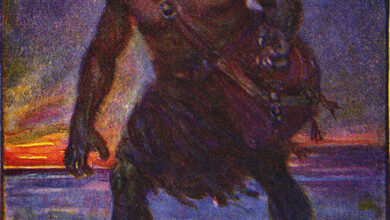
The Devil’s Dictionary by Ambrose Bierce
Originally published as The Cynic’s Word Book, Ambrose Bierce’s wickedly satirical “reference book” was retitled The Devil’s Dictionary in 1911.
Preface
The Devil’s Dictionary was begun in a weekly paper in 1881, and was continued in a desultory way at long intervals until 1906. In that year a large part of it was published in covers with the title The Cynic’s Word Book, a name which the author had not the power to reject or happiness to approve. To quote the publishers of the present work: “This more reverent title had previously been forced upon him by the religious scruples of the last newspaper in which a part of the work had appeared, with the natural consequence that when it came out in covers the country already had been flooded by its imitators with a score of ‘cynic’ books — The Cynic’s This, The Cynic’s That, and The Cynic’s Other. Most of these books were merely stupid, though some of them added the distinction of silliness. Among them, they brought the word “cynic” into disfavor so deep that any book bearing it was discredited in advance of publication. Meantime, too, some of the enterprising humorists of the country had helped themselves to such parts of the work as served their needs, and many of its definitions, anecdotes, phrases and so forth, had become more or less current in popular speech. This explanation is made, not with any pride of priority in trifles, but in simple denial of possible charges of plagiarism, which is no trifle. In merely resuming his own the author hopes to be held guiltless by those to whom the work is addressed — enlightened souls who prefer dry wines to sweet, sense to sentiment, wit to humor and clean English to slang. A conspicuous, and it is hope not unpleasant, feature of the book is its abundant illustrative quotations from eminent poets, chief of whom is that learned and ingenius cleric, Father Gassalasca Jape, S.J., whose lines bear his initials. To Father Jape’s kindly encouragement and assistance the author of the prose text is greatly indebted.
Carnegie the dauntless has uttered his call
To battle: "The brokers are parasites all!"
Carnegie, Carnegie, you'll never prevail;
Keep the wind of your slogan to belly your sail,
Go back to your isle of perpetual brume,
Silence your pibroch, doff tartan and plume:
Ben Lomond is calling his son from the fray --
Fly, fly from the region of Wall Street away!
While still you're possessed of a single baubee
(I wish it were pledged to endowment of me)
'Twere wise to retreat from the wars of finance
Lest its value decline ere your credit advance.
For a man 'twixt a king of finance and the sea,
Carnegie, Carnegie, your tongue is too free!
Anonymus Bink
governing himself for the advantage of good government. In justice to him it should be said that he did not want to.
They took away his vote and gave instead
The right, when he had earned, to eat his bread.
In vain -- he clamors for his "boss," pour soul,
To come again and part him from his roll.
Offenbach Stutz
Once I dipt into the future far as human eye could see,
And I saw the Chief Forecaster, dead as any one can be --
Dead and damned and shut in Hades as a liar from his birth,
With a record of unreason seldom paralleled on earth.
While I looked he reared him solemnly, that incadescent youth,
From the coals that he'd preferred to the advantages of truth.
He cast his eyes about him and above him; then he wrote
On a slab of thin asbestos what I venture here to quote --
For I read it in the rose-light of the everlasting glow:
"Cloudy; variable winds, with local showers; cooler; snow."
Halcyon Jones
Should you ask me whence this laughter,
Whence this audible big-smiling,
With its labial extension,
With its maxillar distortion
And its diaphragmic rhythmus
Like the billowing of an ocean,
Like the shaking of a carpet,
I should answer, I should tell you:
From the great deeps of the spirit,
From the unplummeted abysmus
Of the soul this laughter welleth
As the fountain, the gug-guggle,
Like the river from the canon [sic],
To entoken and give warning
That my present mood is sunny.
Should you ask me further question --
Why the great deeps of the spirit,
Why the unplummeted abysmus
Of the soule extrudes this laughter,
This all audible big-smiling,
I should answer, I should tell you
With a white heart, tumpitumpy,
With a true tongue, honest Injun:
William Bryan, he has Caught It,
Caught the Whangdepootenawah!
Is't the sandhill crane, the shankank,
Standing in the marsh, the kneedeep,
Standing silent in the kneedeep
With his wing-tips crossed behind him
And his neck close-reefed before him,
With his bill, his william, buried
In the down upon his bosom,
With his head retracted inly,
While his shoulders overlook it?
Does the sandhill crane, the shankank,
Shiver grayly in the north wind,
Wishing he had died when little,
As the sparrow, the chipchip, does?
No 'tis not the Shankank standing,
Standing in the gray and dismal
Marsh, the gray and dismal kneedeep.
No, 'tis peerless William Bryan
Realizing that he's Caught It,
Caught the Whangdepootenawah!
An animal usually living in the vicinity of Man, and having a
rudimentary susceptibility to domestication. It is credited by
many of the elder zoologists with a certain vestigial docility
acquired in a former state of seclusion, but naturalists of the
postsusananthony period, having no knowledge of the seclusion,
deny the virtue and declare that such as creation's dawn beheld,
it roareth now. The species is the most widely distributed of all
beasts of prey, infesting all habitable parts of the globe, from
Greeland's spicy mountains to India's moral strand. The popular
name (wolfman) is incorrect, for the creature is of the cat kind.
The woman is lithe and graceful in its movement, especially the
American variety (felis pugnans), is omnivorous and can be
taught not to talk.
Balthasar Pober
contrast the foreknown futility.
Ambitious fool! so mad to be a show!
How profitless the labor you bestow
Upon a dwelling whose magnificence
The tenant neither can admire nor know.
Build deep, build high, build massive as you can,
The wanton grass-roots will defeat the plan
By shouldering asunder all the stones
In what to you would be a moment's span.
Time to the dead so all unreckoned flies
That when your marble is all dust, arise,
If wakened, stretch your limbs and yawn --
You'll think you scarcely can have closed your eyes.
What though of all man's works your tomb alone
Should stand till Time himself be overthrown?
Would it advantage you to dwell therein
Forever as a stain upon a stone?
Joel Huck




